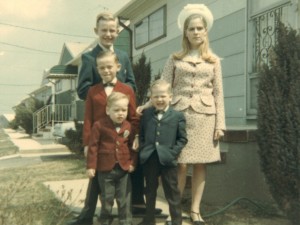 I trudged through 14 pages of teensy-sized font, carefully taking notes, to learn from respected research on secrets of “the good life.” Why? Because this mother-of-a-study makes an unusual discovery.
I trudged through 14 pages of teensy-sized font, carefully taking notes, to learn from respected research on secrets of “the good life.” Why? Because this mother-of-a-study makes an unusual discovery.
The Harvard Study of Adult Development, one of THE longest-running and very exhaustive longitudinal studies of mental and physical well-being in history followed 268 men who graduated college in the late1930s. (And they’re still being followed.)
Begun in 1937 as a study of healthy, well-adjusted Harvard sophomores (all male, sorry gals, but it was way before we were visible), it has followed its subjects for more than 70 years, through WW II, marriages, divorces, professional advancement and collapse, and now into retirement.
The men have submitted to regular medical exams, taken psychological tests, returned questionnaires, and sat for interviews. Each fat file sits in a locked cabinet and as the study’s survivors approach death - roughly half are still living and in their late 80s - Joshua Wolf Shenk, director of the Rose O’Neill Literary House at Washington College, was granted unprecedented access to case files ordinarily restricted to researchers.
From the start, the study was about normal people - undergraduates who could “paddle their own canoe.” (Stated such, it appears they didn’t want men contemplating what-will-I-be-when-I-grow-up or sophomores angling to hitch a ride in someone else’s canoe.) They have been measured from every conceivable angle and with every available scientific tool.
So what makes for a good life? What is the formula - the special concoction of love, work, play - we should strive for? I bet you are anxious to know! I quite couldn’t wait.
Well, after 72 years, the answer is sketchy - so sketchy, it’s safe to say, “no one knows a thing.” Seems human lives defy science, Shenk writes, “Indeed, the lives themselves - dramatic, pathetic, inspiring, exhausting - resonate on a frequency that no data set could tune to.”
All is not lost. While clueless as to how we can ensure being “happy,” here’s what you better do if you want to be physically and psychologically healthy - “Happy-Well” - in your old age: Snub out that cigarette, quit slurping your martinis, buy a Kindle, use the stairs, don’t get fat and always get lemonade made out of life’s frequent lemons.
If you are interested in director George Vaillant’s list of the 7 major factors that predict healthy aging, here you go:
1. Employing mature adaptations (the creative ways we turn pain into gold)
2. Education
3. Stable marriage
4 Not smoking
5. Not abusing alcohol
6. Some exercise
7. Healthy weight
Twelve pages into the report, I finally find the best take-away for you, my dear readers.
“What have you learned from the Grant Study men?” Shenk asks.
“That the only thing that really matters in life are your relationships to other people,” replies the head guru, Valliant who has been guru-ing at this study his whole life.
Although we intuitively know our relationships are key to our happiness, there’s something very reverent here since this is one of the only conclusions resulting from SEVENTY YEARS of research (and god only knows how much it’s cost!).
Turns out good sibling relationship seems especially powerful: 93% of men in the Grant Study who were thriving at age 65 had been close to a brother or sister.
This brings me to your sabbatical. At yourSABBATICAL, we strive to hold people accountable for doing what you want to do on your career break, not what others - your partner, kids, mother - want you to do. But if relationships matter more than anything else, perhaps a hybrid-sabbatical is something to consider - where you spend part of the time being selfish (doing what you want to do) and the other part with someone who counts in your life.
Those siblings count for a lot, if you are making a run for “Happy-Well”. How do two weeks volunteering in Haiti with that little brother of yours sound? You know, the one you haven’t spoken with in a couple of years?
Would you consider one week at Esalen with your older sister? Remember when she told Mom that you were rolling joints upstairs in your bedroom closet?
Just something to think about.
For interviews with surviving Grant Study (named after the patron) subjects, visit www.theatlantic.com/grant.
Although the Grant Study men remain anonymous, a handful have publicly identified themselves - including Ben Bradlee, long-time editor of The Washington Post. John F. Kennedy’s involvement has been confirmed, but his files are sealed until 2040.
No Responses Yet…